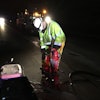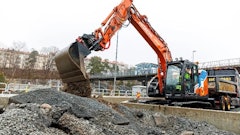
Get ready for cement trucks, construction hats and employed people inside them.
Gov. Charlie Crist and his stimulus czar defended the state's allocation of transportation stimulus money Friday, saying that their strategy of favoring substantial projects over speedy ones is about to pay off, putting people to work.
"We're seeing a rapid buildup in terms of the work that is commencing around the state," Florida economic stimulus special adviser Don Winstead said Friday. "This fall is going to be a very active time around the state."
Florida has been criticized in recent months for spending its transportation stimulus money too slowly. Even now, it has assigned $1.3 billion to projects, but less than 1 percent of that money has actually left the federal government's coffers, according to the U.S. government.
Transportation spending, which is only about $50 billion of the $787 billion American Recovery and Reinvestment Act, was always expected to be a slower source of stimulus, as roadwork takes longer than rebates.
But it is a particularly important one because it also is expected to provide a large percentage of the jobs the act was promised to create. And it has lagged behind early projections nationwide, which is a sore spot for critics (and congressmen) who want quicker relief.
In Florida, officials say projects now are getting under way.
"In the next couple of months, you're going to see a lot of these projects actually breaking ground and getting going," said Barbara Kelleher, a spokeswoman for the Florida Department of Transportation's District 4, which includes Palm Beach, Martin and St. Lucie counties.
For example, a project to widen State Road 70 in St. Lucie began in September, and another to replace the Tequesta Drive Bridge is scheduled to start by Dec. 1.
As recently as August, U.S. Rep. James Oberstar, D-Minn., chairman of the House Transportation and Infrastructure Committee, rebuked Crist for the state's slow rate of transportation spending. In September, only 4 percent of Florida's transportation projects had been approved to start construction, the lowest rate in the nation, according to data from ProPublica, a nonprofit news organization that is tracking stimulus spending.
State officials have blamed those delays on the types of projects they picked.
Florida put much of its money to adding capacity -- principally, widening existing roads, building new ones and adding bridges. Most states focused on road improvements, such as resurfacing, that can be started more quickly.
"Congestion really strangles commerce," Winstead said.
On Friday, Crist and Winstead pointed to a recent federal report they say backs up that explanation -- a routine update by the Government Accountability Office that noted "wide differences in how funds were used" by different states.
In a letter to Florida's congressional representatives, Crist said Florida's choice was "exactly the right strategy for our state, and will result in more sustained economic development and more substantial job creation."
Florida is not the first large state to face this choice. Oberstar similarly rebuked Virginia for slow transportation spending; its governor, Tim Kaine, responded that the state was investing its money in new projects instead of ones already planned.
Meanwhile, today is the last day for officials to file reports on how they have spent stimulus money so far. That data is being collected by the federal government. All of it will be available at recovery.gov at the end of the month.















